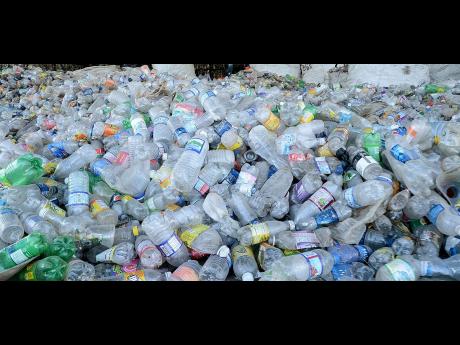PET bottles price slippery slope
What does the price of crude oil on the international market have to do with how much you get paid for the plastic bottles sold to Recycling Partners of Jamaica Limited?
Everything, according to Ann Marie Rodriques, business deve-lopment manager of the company that has its headquarters at 22A Lyndhurst Road, Kingston, as well as collection depots at 11 Waterloo Road, also in Kingston, Manchester and Morant Bay,
St Thomas.
That is because the main material - PET (polyethylene terephthalate) - is derived from petroleum. Polyethylene terephthalate is, in fact, a plastic resin and the most common type of polyester, which was discovered and patented in England in 1941.
Recycling codes are used to identify the material from which an item is made in order to facilitate easier recycling or other reprocessing. The universal code for PET is the numeral one inside a triangle, usually imprinted at or near the bottom of the bottle or any other such container.
So again, what does that have to do with the rate Recycling Partners of Jamaica pays for the PET bottles it compresses and bales prior to export?
"Our rates fluctuate depending on the price of petroleum, and with the prices falling the other day, our prices were adjusted downward," Rodriques told The Gleaner. "We are part of an international network because it's exported and the price is determined externally. There are other factors locally that we look at, but primarily it's based on the price that we can get once we export or sell to the buyer or broker who is exporting. Their price is determined by what takes place on the international market. The highest we've paid so far is J$6 a pound but with the recent decrease, it has gone down to J$5."
She explained further: "PET is largely made of petroleum-derived material, so what happens is that when the price of petroleum decreases, then it is more economical to use virgin material in the production of the bottles, rather than using recycled material. However, when the price of the virgin material is high, there is a greater rate of substitution with recycled material to cut costs, because the recycled material is cheaper than the virgin material which is petroleum-based."
The business development manager pointed out that as more persons buy into the recycling initiative, the company has also sought to step up its game and recently partnered with LASCO Financial Services in a 'Clean Up, Pay Up' pilot programme that will allow customers to encash their bottle-payment vouchers at select LASCO MoneyGram agents.
Environmentally aware
"Jamaicans are becoming more aware of the environmental impact of improper waste disposal, so this is an important step in making a positive change and reducing the nation's carbon footprint," Rodriques pointed out.
Though Recycling Partners of Jamaica has five partner collection locations, the pilot programme allows persons to turn in bottles at the Lyndhurst Road location, where they will be valued based on weight.
Participants then receive a numbered and signed voucher which authorises them to collect cash at select LASCO MoneyGram locations with their government issued ID. Security measures have also already been put in place to deter fraudulent behaviour. Recycling Partners of Jamaica has plans to introduce additional depots soon with the capacity for voucher widen.
Jacinth Hall-Tracey, managing director of LASCO Financial Services Limited, said, "We are happy to put our technology platform to work to give a boost to the everyday Jamaican. The widespread network of our LASCO Financial Services retail locations makes it easier for the average person to collect cash. The programme responds to the need for more effective solid-waste disposal in the Corporate Area and is expected to have particular benefit for persons who desperately need opportunities to earn an income."

